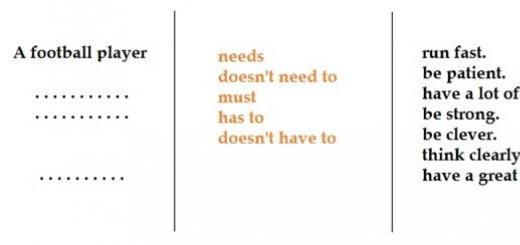If you have never learned English or you once studied at school, but completely forgot everything, even the alphabet, and now you have decided to start learning English from scratch, then our advice on where to start and how to move may be useful to you. The first and most important thing is to understand how much you need the language, why you need it, and whether you have enough resources to learn the language.
Motivation
Motivation should be your driving force; without it, you will not be able to practice the language daily for a long time. Without daily practice it is impossible to master this huge layer of knowledge. If there is no obvious motivation, but there is a burning desire to learn the language, then you should think about what knowledge of the language will give you - maybe it’s a new prestigious job or the opportunity to read special literature on topics that interest you, or maybe you travel a lot and want to fully communicate with people around the world or correspond with foreign friends.
Your motivation may still be in the subconscious. Try to extract it from there, it will play a decisive role in your successful progress in mastering the English language.
Choosing a teaching method
Your next step should be to choose teaching methods or teachers. Now students have access to very good language materials And large number teachers who are ready to study via Skype with students from all over the world. Ideal, of course, is to find a good teacher who is a native speaker. But not everyone can afford such opportunities, and some simply want to study independently and for free, at a convenient time, without any stress, according to their own schedule. Then you need to choose a system that you will follow.
Learning English from scratch takes time
Plan time for studying, you need to study every day, at least 15 - 20 minutes, but it’s better to set aside an hour for studying. In our selection of articles “English from scratch” you will find materials for beginners, audio recordings and videos, exercises, a large number of examples, explanations, as well as links to resources that will help you progress faster.
When choosing your study resources, make sure you like the materials. This is important, all polyglots talk about it. Interest plays a role in language acquisition main role. It allows you to achieve more with less effort. Just imagine that you need to learn or translate a text on some boring topic for you, but you will fall asleep after the first phrase! On the contrary, if you come across an interesting book, you will definitely find time to read it. Go ahead, friends, devote your time and attention to the language, and you will raise your English from scratch to fluency. Good luck everyone!
Let's start lesson 1 ENGLISH FOR BEGINNERS.
Letters and sounds are not the same thing
We begin learning English with the simplest thing - sounds. Please note - not from letters, but from sounds. There is a big difference between letters and sounds. The word is written with letters, and pronounced with sounds. For example, Russian word milk is written letters m-o-l-o-k-o, but pronounced sounds m-a-l-a-k-o. Thus, sounds and letters are not the same thing. In order not to confuse one with the other, it is customary to put sounds in square brackets - [m-a-l-a-k-o].
In our English course for beginners, we will first learn to pronounce sounds and then find out what letters can represent these sounds in writing. In this lesson, we will first of all learn those sounds that coincide with Russian (or at least very similar to Russian).
Sounds [m], [f], [v], [p], [b]
The following sounds are almost identical in their pronunciation to Russian:
[m] = [m]_
[f] = [f]_
[v] = [in]_
[p] = [p]_
[b] = [b]_
However, pronunciation English sounds has some features:
The lips are slightly stretched.
At the end of a word ringing sounds[v] and [b] are not stunned. For example, in Russian, voiced sounds at the end of words are replaced by their voiceless counterparts. Yes, word oak we pronounce it as [dup], i.e. we stunned the final [b]. This is unacceptable in English!
The sound [p] is pronounced energetically and with slight aspiration (aspiration).
Exercise. Listen and repeat:
Play exercise
[m]–[m]–[m]_[f]–[f]–[f]_
[v]–[v]–[v]_
[p]–[p]–[p]_
[b]–[b]–[b]_
The first English lesson for beginners is over. As you can see, there is nothing difficult in learning English. All you need is a little free time and effort.
In order to learn a language, as a rule, you need two main things: firstly, it great desire. It must be just crazy. And secondly, this enough money. But to learn English on your own, you don’t need any cash- it is enough to have a great desire and a good level of self-discipline. So, English from scratch lesson 1 says - to learn to speak English, you just need to want it. It’s as simple as that – if there is no desire, then nothing will happen. There is a great desire and brutal interest - you will achieve everything you want. In addition, there are 6 more tools that will help you achieve your goal.
- The most important thing is learning new words. In order to learn English from scratch, you don’t need to immediately overwhelm yourself with new words. Every day you need to learn 20 new words, no more. 20 words need to be not only memorized, but learned. An excellent solution would be to hang lists on the walls so that you always remember them. It is advisable to start by choosing words based on general topics- for example, colors, names of objects, body parts, professions, animals, and so on. Thus, you will have 24 hours to study 20 words - this is quite enough.
- Read. Stories, articles, fairy tales. This is another good option to learn English from scratch. There is also no need to overdo it - one small article a day - minimum required, increasing your level of knowledge and increasing your vocabulary. When reading, you should try to immediately understand only general meaning read, while trying not to look for translations of unfamiliar words in the dictionary - look carefully at the entire sentence. Words in English have many meanings, so it is important to understand the meaning of the entire sentence, not just a single word.
- Songs. This is another way to learn English. Notice how many foreign songs have penetrated our lives - we hum them without even understanding the words. Learning English from scratch according to the program usually does not involve learning songs, but, as it seems to us, it is much easier to learn the translation of already known songs than to learn completely unfamiliar words. Disassemble, or better yet, only one verse or chorus, paying attention to set expressions, which are very common in songs. Try to select a more traditional type of material to study, without using songs of complex styles, as it happens that English speakers themselves do not understand the words of these songs.
- Along with books, articles and songs, watch movies to learn a language. This is English lesson 4 from scratch. But again, not every movie is suitable. The rule here is - select only those films that you have already watched in Russian translation and that you liked. Eat real examples, when a person learned a language only from the films or TV series he watched. While watching a movie, write down unfamiliar words and phrases if possible, and then learn them. In this case, of course, you will need subtitles. The main advantage of this method is that you hear words that are unfamiliar to you, but already know how they are translated. This is undoubtedly a big plus.
- The most important point in learning any language is communication with its native speaker. And learning English is no exception. Students who constantly communicate, for example, with the English, achieve success much faster than others, and the quality and correctness of their conversation and understanding are an order of magnitude higher. The secret may lie in the fact that most of the expressions they use in conversation cannot be found in a regular dictionary. Do you know how many greeting phrases there are? In any case, practice is always more useful than theory.
- Learn to speak correctly!To do this, in addition to new words and expressions, you need to study grammar and the correct formation of various sentences. Very common mistakes are made when using such common words as Both, Either, Neither, Nor and So, Some and Any, Little and Few, Much and Many, modal verbs and so on. But their use comes down to just a few rules. After studying these rules, be sure to test your understanding of them using a variety of tests and exercises. They will help you identify weaknesses in what you have learned and consolidate your knowledge.
Learn English. Show others and yourself, first of all, that you can achieve any goal you set in life!
There is so much information about English that it is easy to get confused!
Dear readers! I know from my own experience how difficult English is for beginners. And the point is not a lack of textbooks or information, but rather an excess of them, information noise that is impossible to understand.
In this article, I have collected and systematized materials from the site that will be useful for beginners, those who are learning English from scratch. In these articles, I share my opinion on where to start learning a language, what online resources and books are best to use, where to find good video lessons, how to choose courses and where to find an online tutor.
Where to start learning English?
If you decide to learn English “from scratch,” then you need to go from simple to complex, from the most necessary to the rarer. First of all, try to lay the foundation for future knowledge and skills and learn the basics of the language. The most basic knowledge includes:
Having laid the foundation, you need to practice a lot and in a variety of ways in all types of speech activities: reading, listening, writing and speaking in English.
Actually, that's all. You just listened short course language learning! The rest is details and particulars.
You can find the necessary materials both on this site (links above) and in textbooks and online training courses for beginners. I recommend that at the initial stage you study using a textbook for independent study (self-instruction manual). In my opinion, the most convenient way to learn the basics of a language is from a textbook, using interactive materials, such as vocabulary cards, as auxiliary.
You can also use mine as a tutorial.
What websites are there for English language beginners?
The main advantage of the textbook is that the material is presented in a methodically correct order, in convenient portions. You don’t have the feeling that you are wandering in the dark; the textbook literally leads you by the hand, giving extremely specific instructions. But in addition to textbooks, you can also study using educational programs - they contain a lot of audiovisual materials, and the learning process is built in a game form. The following sites are suitable for beginners:
“Teacher Method” – a step-by-step course for children and adults
“Teacher Method” is an interactive course for different levels, starting from almost zero. It includes courses of three difficulty levels for adults and children, as well as a separate children's course for the little ones.
In the course for beginners, learning begins with the alphabet, all explanations are made in the form of short videos in Russian with explanations from teachers, and tasks are given in the form of interactive exercises. The material is chewed down to the smallest detail. The service is paid, but is available free of charge in a limited form.

Lingvaleo is a service for self-study English using:
The lesson plan is created automatically and looks like a list of “Today's tasks”, but it is not necessary to follow it. The site has a lot of audio, video and text materials of different levels of complexity - from simple to original materials of foreign TV, so it is suitable not only for lesson-based language learning, but also for practice in reading and listening. Most of the features are free, but for an additional fee you can purchase interactive courses (for example, grammar or English for children) and unlock some word learning modes.

Duolingo
A free interactive course, in which, like in the “Teacher Method”, you need to go from lesson to lesson. But there are almost no explanations here; training is built on a different principle. You need to complete tasks, studying the practical side of grammar and applying the vocabulary learned at the beginning of the lesson in practice: constructing and translating phrases. It is not advisable to take this course as a basis for learning English, but it is suitable as an auxiliary educational game.

English for beginners: free video lessons
Useful Internet resources are not limited to just educational sites. Fortunately, there are now a lot of useful, interesting and free video lessons. Lessons are available in both Russian and English.
For beginners, it is better to start with lessons in Russian. For example:

I believe that it is better for beginners to study with Russian-speaking teachers, and here’s why:
- He better understands the peculiarities of teaching specifically Russian-speaking students.
- At the initial stage, it is better to explain tasks and rules in Russian.
- It will be too difficult for you to understand a teacher who does not speak Russian.
The principles of language learning are very simple and have been known for a long time.
1. Set specific and achievable goals
It is much more convenient to move towards a goal when it is marked than when it is an unclear fog over the horizon. Why did you decide to learn the language in the first place? To get a job as a chief engineer at New Development Engineering? To move in with your aunt in Sydney? Your goals will largely determine how you go about achieving them. For example, if you want to study at a foreign university, you will need to be able to write correctly, which is not so important for a trip to the USA under the Work and Travel program.
It is advisable to set short-term goals in addition to long-term goals. For example, complete lessons 1 – 6 in two weeks, learn 100 words in a week, read the first chapter of Harry Potter in a month, etc. There is no need to set unrealistic goals. It's better to take small steps, but without stopping.
2. Try to exercise regularly, preferably every day!
Ideally, you need to practice every day for 1-2 hours. In practice, not everyone will be able to do this, but if you really want to, you can set aside at least half an hour a day. The main thing is not to deceive yourself by coming up with excuses about lack of time and crazy busyness. It's okay if you watch half an hour less TV or get things done half an hour earlier.
Even if you are a businessman/supermodel/pizza delivery guy, finding at least 15 minutes a day in your crazy schedule is exactly 15 minutes better than 0 minutes. And don’t forget that you can listen to audio lessons while you’re dying of boredom in a traffic jam.
There is no need to organize crazy marathons once a month either. It is better to exercise for 30 minutes 7 times a week than 210 minutes once a week. What's the point of running a 3-4 hour marathon a day if everything is forgotten within a week?
3. Practice makes perfect
You don't need any great intelligence or talent to learn a language. You just need to practice regularly - that’s all. Pay attention to all aspects of the tongue: vocabulary, grammar, practice in reading, listening, speaking and writing– and everything will be ok. Don't get hung up on theory and try to practice more.
Language is a means of communication, transmission and perception of information, knowledge, and expression of emotions. They need to be used. Learning a language but not using it is like learning swimming from books without diving into the water. Read and listen more, don’t hesitate to communicate!
 English is one of those languages that is extremely in demand all over the world. No matter what experts say about what is now developing extremely rapidly Chinese, and no matter what statistics appear about Spanish-speaking countries, in the end the English language always holds the palm. The fact is that this language has long become not just the language of business negotiations and tourist trips, but the main international language, which is spoken to one degree or another by the inhabitants of many countries.
English is one of those languages that is extremely in demand all over the world. No matter what experts say about what is now developing extremely rapidly Chinese, and no matter what statistics appear about Spanish-speaking countries, in the end the English language always holds the palm. The fact is that this language has long become not just the language of business negotiations and tourist trips, but the main international language, which is spoken to one degree or another by the inhabitants of many countries.
It is known that large hotels, restaurants and other public establishments hire English-speaking staff who can communicate freely with customers. English will also be useful for those who simply want to read the instructions for household appliances. The basis of any language is the alphabet. An educational video will introduce you to the English alphabet.
Video training “English from scratch. Lesson 1. Alphabet"
What letters does the English alphabet consist of?
English alphabet requires increased attention from the student, because knowledge of how letters and their combinations are read is important for further learning. There are 26 letters in the English alphabet - 6 vowels and 20 consonants. English was formed on the basis of the Latin alphabet. Below you can find english letters and a transcription for them:
- 1st letter of the alphabet “A” (hey);
- 2nd letter of the alphabet “B” (bi);
- 3rd letter of the alphabet “C” (si);
- 4th letter of the alphabet “D” (di);
- 5th letter of the alphabet “E” (i);
- 6th letter of the alphabet “F” (ef);
- 7th letter of the alphabet “G” (ji);
- 8th letter of the alphabet “H” (hey);
- 9th letter of the alphabet “I” (ai);
- The 10th letter of the alphabet is “J” (jay);
- 11th letter of the alphabet “K” (kei);
- 12th letter of the alphabet “L” (el);
- The 13th letter of the alphabet is “M” (em);
- 14th letter of the alphabet “N” (en);
- 15th letter of the alphabet “O” (оу);
- 16th letter of the alphabet “P” (pi);
- 17th letter of the alphabet “Q” (Q);
- 18th letter of the alphabet “R” (a, ar);
- 19th letter of the alphabet “S” (es);
- 20th letter of the alphabet “T” (ti);
- 21st letter of the alphabet “U” (u);
- The 22nd letter of the alphabet is “V” (vi);
- 23rd letter of the alphabet “W” (double u);
- 24th letter of the alphabet “X” (ex);
- The 25th letter of the alphabet is “Y” (yay);
- The 26th letter of the alphabet is “Z” (zed).
These 26 letters form the 40 sounds of the English language. Repeating after the announcer, read the letters. Pay attention to how these letters are transcribed (symbols in brackets). Having learned english alphabet, you can move forward by moving on to reading letter combinations and even words. Later, having learned the rules of intonation, you can freely read simple sentences and even texts.










